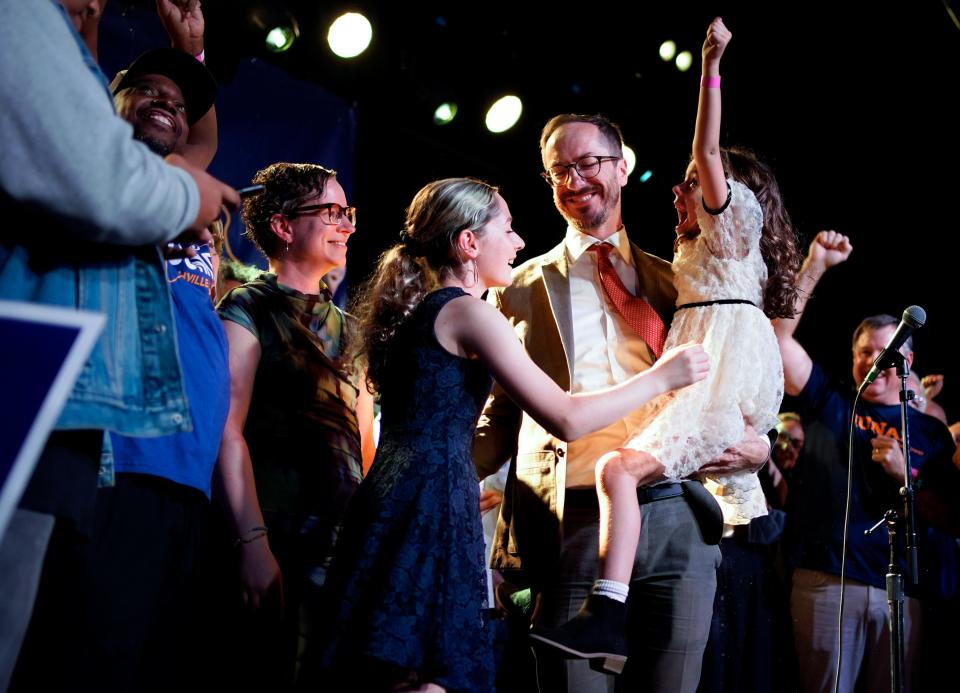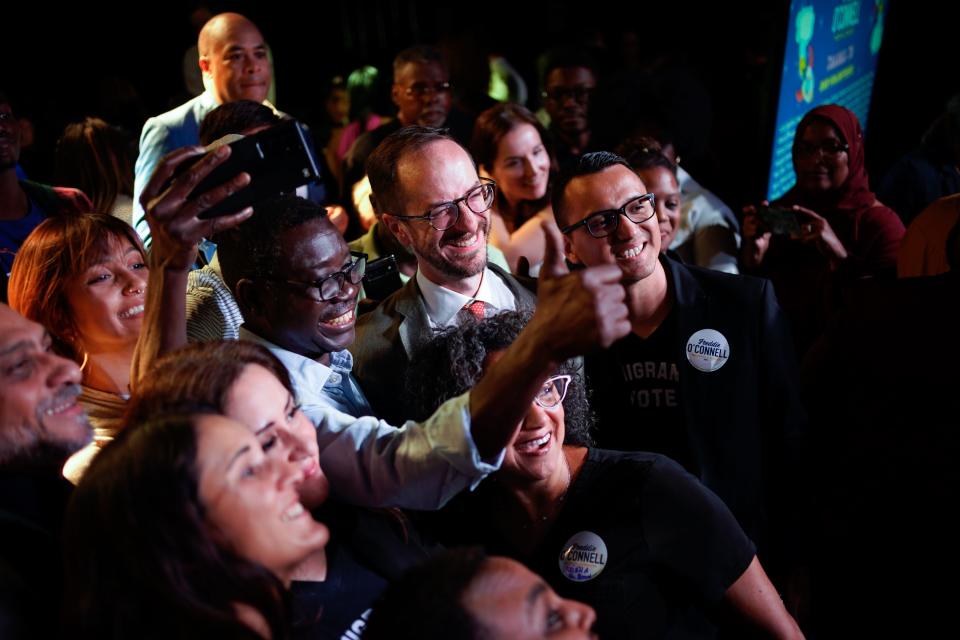Inside Nashville Mayor-elect Freddie O'Connell's plans for first 100 days in office
- Oops!Something went wrong.Please try again later.
Nashville Mayor-elect Freddie O'Connell secured a decisive victory over opponent Alice Rolli on Thursday, marking an end to a 16-month-long campaign built on promises to prioritize Nashville residents above all else.
Now, the real work begins.
The former two-term downtown Metro Council member defeated Rolli in a landslide 64% to 36% vote.
O'Connell, who will be Metro Nashville's tenth mayor, awoke on Friday to pack a lunch for his 12-year-old daughter. Then he walked out the door to start building a team to lead the city.
He credits the win to the support of his campaign team and more than 200 volunteers who helped spread his message.
"I saw a path built around what I was feeling as a Nashvillian and certainly a message that was consistent with what I was feeling as a Nashvillian, and that really was that the priorities of we as a people living in a city were not always being met with the investments and the priorities of local government," he told The Tennessean on Friday morning.
O'Connell was a surprise frontrunner in an election without an incumbent, rising to the top of a crowded field of candidates spanning state senators, city leaders, elected officials and business executives. He ran a thrifty campaign without the support of personal loans, ultimately attracting around $2 million in donations from community members, businesses and political action committees — several of which at times have clashing interests.
He presented himself as an average Nashvillian and the "only truly progressive candidate," pledging to restore fundamental Nashville services, advance a workable public transit plan and invest in education and affordable housing.
Rolli, a business leader and former political strategist, shaped her campaign around uprooting Nashville's "permanent political class" to save the city from the "recipe book that has failed other big cities of higher taxes, higher crimes and failing schools." She earned a place in the runoff thanks to strong support in Davidson County's outermost precincts, where conservative-leaning candidates have historically seen the most success.
O'Connell announced three transition committee chairs Friday morning: former Nashville Metropolitan Board of Health Chair Dr. Alex Jahangir, human resources and leadership professional Christy Pruitt-Haynes, and local attorney David Esquivel. They will head committees focused on how Nashville works, moves and grows.
Who won?: Nashville picks a new mayor, council makes history: What to know after election night
Related: Women capture all five at-large Nashville council seats and put Tennessee on notice
Familiar challenges lie ahead for new Nashville mayor
O'Connell's resident-centered campaign tapped into long-simmering sentiments. Mayor John Cooper, his predecessor, unseated former Mayor David Briley in 2019 with a similar platform.
O'Connell now faces many of the same challenges: rising housing costs, mounting infrastructure needs, a deeply fractured relationship with state lawmakers and managing Nashville's continued supercharged growth, to name a few.

A frequent transit network, a standalone Office of Housing, initiatives to support Metro Schools and a multifaceted, equity-grounded community safety plan top a list of "15 fixes" O'Connell campaigned on being able to execute starting on day one.
Karl Dean, who served as Nashville mayor from 2007 to 2015 and appointed O'Connell to the Metropolitan Transit Authority Board during his tenure, said strengthening public education is the biggest challenge O'Connell will face.
"That's the biggest challenge facing almost any city in America," Dean said. "But if Nashville gets that right, I think then we get almost everything else right, because we're already doing well economically.... If kids are in school doing well, the city's going to be safer."
O'Connell will also inherit a number of projects started during Cooper's tenure, including the development of Nashville's East Bank. The Metro-owned riverfront land will also feature a new $2.1 billion Tennessee Titans stadium as part of a deal spearheaded by Cooper's administration. O'Connell voted against the stadium deal while serving on Metro Council, something he prominently advertised in his mayoral campaign. The East Bank's success will be measured by the affordability and accessibility of the housing and public space created there, O'Connell said. He intends to begin work on East Bank negotiations right away, in parallel with constructing his administrative team.
He'll also shepherd the transformation of the Global Mall into a Southeast transit hub and other uses. Metro purchased the property under Cooper, who intended to lease a portion to Vanderbilt University Medical Center for a health care hub. That deal has yet to materialize. A proposed deal with Bristol Motor Speedway to renovate the Nashville Fairgrounds Speedway and the future of the now Metro-owned historic Tennessee School for the Blind are other remnants from Cooper's administration.
Briley, who became Nashville's eighth mayor following former Mayor Megan Barry's March 2018 resignation, said Nashville's growth and equity pains are good challenges to face.
"It's not necessarily anything new ... it's just a higher level of intensity of all the problems we previously had: housing costs, displacement through gentrification, public education and long-running conflict with the state," he said.
Cooper and Briley said the next mayor will inherit a financially sound city. Barry said it's more complex.
Nashville's improved financial situation, she said, resulted in large part from a 34% property tax increase under Cooper (which O'Connell approved during his council tenure) and an influx of one-time federal funding surrounding the COVID-19 pandemic, in addition to strengthened fiscal policy.
Finding recurring revenue to continue funding programs started with that money will be a significant challenge for O'Connell, she said.
Barry, who endorsed O'Connell during the runoff campaign, said his extensive policy knowledge and familiarity with Metro's budget will help him transition into office. But O'Connell's first 100 days will be largely consumed by forming a strong administrative team.
"You don't get to be the policy wonk because you have to be the leader, which is why you want to hire really great policy people around you to put the infrastructure in place to implement the vision that you have," Barry said. "That's a transition I think Freddie will make."
The Metro Charter does not define when a new mayor takes office. An inauguration ceremony date has not yet been set, but will likely fall near Sept. 30, O'Connell said. Metro Council reconvenes on Oct. 3.
Cooper's administration will host a set of transition briefings next week for O'Connell and his team.
O'Connell said his administration build out will be informed by IncluCivics, a report published this year by the Metro Human Relations Commission comparing the demographics and characteristics of those who run Metro versus those who reside in Davidson County. His goal is to have an administration that is as reflective as possible of the city.
"I don't intend to rush anything about this process," O'Connell said. "I would so much rather spend 100 days building an administration to last four years than say we have to get that part of it right on day one. Because we also know Mayor Cooper had some very capable people in his administration, and my hope is that we will be able to persuade some of them to stay with our team."
The week in politics: Lee outlines $20M program for controversial crisis pregnancy centers
Other news: A lawsuit over controversial House sign rules is over. The First Amendment debate is not.
Repairing state relationship
Restoring Nashville's relationship with the state should be the first order of business, according to former mayors Phil Bredesen (1991-1999) and Bill Purcell (1999-2007).
Long-held tension ignited last summer after the Metro Council rejected a draft agreement that would have put Nashville in the running to host the 2024 Republican National Convention. O'Connell abstained from that vote.
Metro and the state are currently embroiled in several lawsuits challenging recently enacted laws that restrict Nashville's local authority.

O'Connell has received congratulatory messages from Republican U.S. Sens. Marsha Blackburn and Bill Hagerty, Tennessee House Speaker Cameron Sexton (R-Crossville), the secretary of state, the comptroller and the National League of Cities, he said Friday morning.
He described their sentiments as "really good, positive communication so far with people clearly expressing an interest, an intent and a willingness to work across the aisle."
"I definitely come in today just encouraged about the opportunity to recalibrate a lot of these relationships," O'Connell said.
His approach to state relations will also rely on strong communication and support from a coalition of regional mayors. Bredesen said he attempted to generate regional backing for common water and sewer services, and moving the Houston Oilers to Nashville but was unsuccessful.
"It would be wonderful," he said. "But I don't think you should underestimate the political difficulties of making that work."
Nashville will need a "high level of collaboration" between surrounding counties and the state to make transit initiatives successful, Purcell added.
The mayoral race reminded many local government devotees of the 2015 runoff matchup between Barry, a progressive-leaning candidate, and David Fox, a more conservative candidate who this year served as Rolli's campaign treasurer. Barry won the seat with nearly 55% of the vote.
Bredesen marks that race as the start of Nashville's mayoral election becoming "more nationalized," something he and Purcell decry.
"I don't believe there is any indication that people are more politically partisan in this race. I think there are some people who would like that to happen … but from experience, that is not where the people of Nashville in general are," Purcell said. "They don't want this to be a partisan political election. They know there is no partisan, political way to deliver the services of a city."
To those who did not vote for him, O'Connell offers hope for common ground.
"There will be some people who disagree with every choice I make going forward, and yet, at the end of the day, the best part about local politics is it's the stuff that is the most tangible for people," he said. "It's the sidewalks, it's the trash collection. And my hope is that a focus on a more effective Metro government is something that all Nashvillians will be able to participate in and perceive."
This article originally appeared on Nashville Tennessean: What Nashville Mayor-elect Freddie O'Connell faces in first 100 days

